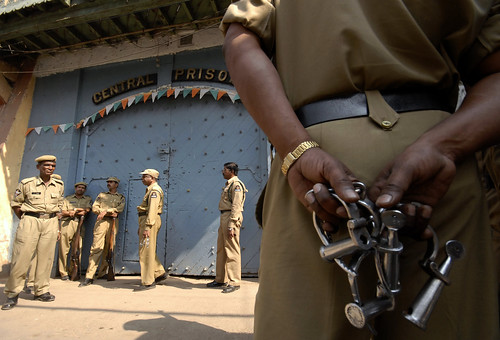No entry into prison without a bribe

What is the most interesting bribe/corruption story that you have read about? This was a question posed to me by an anti-corruption activist. I tried to list down some of the strange corruption stories that I had read and managed to recall those that were 'different'. Of the various bribe stories that came my way, the one involving undertrial prisoners and policemen caught my eye and remained in my memory for a long time.
I had read it more than 10 years ago in a Tamil magazine in Chennai. The story got me curious and I enquired on the same with friends and fellow reporters who surprisingly confirmed that it was true. This was certainly a stray instance and even the report had mentioned that it was a practice restricted to one or two jails which had quite a few enterprising souls. However, one is not sure whether it is in vogue now.
The story runs like this. Undertrial prisoners are held in various jails and are taken to various courts for their case hearing before the magistrates. It is the duty of police officers to come to the prison, where the accused are held with the requisition order and take these prisoners to the courts in the city or its outskirts.
While this is common practice, a twist was brought in this otherwise simple process. While the policemen are allowed to take the undertrial to court, the prisoner is not allowed to re-enter the prison premises unless a bribe is paid to the lower level jail staff. The lower level jail staff would claim that the jail is full and unless a bribe is paid by the policeman, they would not allow the prisoner in. There are also cases, when the undertrial prisoner is not taken back in, citing that the time to bring in the prisoner has lapsed and hence he needs to be shifted to a larger jail - perhaps one which runs round the clock. But slip a few notes inside, and the jail gates would miraculously open.
For an affluent prisoner, it is no issue. The burden of paying the bribe falls on the accused, who would pay the cop, who in turn would pass it on to the lower level jail staff. If the prisoner was just another vagabond facing trial, the burden of paying the bribe falls on the policeman.
When I enquired on this issue, I was surprised to find that policemen and jail staff did not see themselves as part of one law-enforcement community. There was a lot of 'inter-departmental' rivalry between them.
If the jail staff refuse to take in the prisoner, the policeman would have to take him to a jail in another city. Imagine the risk of taking an undertrial by public transport - most probably a crowded bus - to another city and ensuring that he is safely put up in another jail. Most of the 'prisoner escapes' happen when they are being transported to another city and it is a risk that policemen fear.
Moreover, the policeman needs to go through a lot of hassle for buying the bus ticket and has the additional responsibility of feeding the prisoner and keeping an eye out on him during the long night journeys.
To avoid all this hassle, the policeman pays up from his pocket to return the undertrial prisoner safely back to jail.
By Venkatesh Kannaiah
